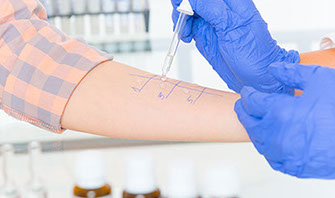<<back to about skin

Contact dermatitis
What is
contact
dermatitis?
What causes
it?
How can I
control the
symptoms?
Tips
Contact dermatitis can be allergic or irritative.
Allergic contact dermatitis is a form of inflammation caused by an allergic response of the immune system in contact with an external allergen.
Irritative contact dermatitis is caused by contact with harsh and irritant substances (acids, solvents, etc.) with no allergic component.
Allergies are acquired over time. That is, we are not born allergic to a given substance, rather we become allergic after coming into repeated contact with the substance in question. Certain substances such as nickel (found in jewellery), chrome (found in cements), fragrances (balsam of Peru), plants (ivy, oak, holm oak), detergents and many other substances can cause allergic contact dermatitis.
Irritative contact dermatitis is a frequent occupational issue, particularly in certain professions such as kitchen staff, doctors, nurses, hairdressers, metal industry workers, etc. who may come into contact with harsh chemicals such as detergents, bleach, hydrochloric acid, soaps, latex, etc.
The initial treatment of the flare-up consists in washing the affected area with plenty of water to eliminate any residues of the allergen or irritant agent.
Your doctor may prescribe topical and/or oral medications to control the itching and inflammation in line with the severity of the symptoms.
In addition, it is essential to repeatedly apply moisturizing creams.
Contact dermatitis heals completely within 2 or 3 weeks, but may reappear if contact occurs again.
- It is essential to identify and avoid contact with the substance triggering the allergy or irritation.
- You can avoid contact by wearing gloves, clothing and protective creams.
- Wash with water and mild soap after exposure.
- Regularly use suitable moisturising creams, particularly after contact or occupational exposure.
Do not hesitate to see your doctor for appropriate diagnosis and treatment.


